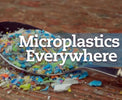
Invisible Plastic, Visible Harm: How Printer Cartridges Are Quietly Fueling the Microplastics Crisis
, by Planet Green, 4 min reading time

, by Planet Green, 4 min reading time
In recent years, concern over microplastics has surged, and for good reason. These tiny plastic particles—smaller than 5 millimeters in size—have been found in the deepest parts of the ocean, the highest peaks on Earth, and disturbingly, in the bodies of humans. They’re in our food, our drinking water, our soil—and even our bloodstream. While many people associate microplastics with water bottles or plastic bags, few realize that printer cartridges are a hidden yet significant contributor to this growing environmental and health crisis.
The Plastic That Doesn’t Go Away
Most printer cartridges are made of complex, durable plastics designed to last. The problem? They're often treated as disposable. Every year, over 375 million ink and toner cartridges are thrown away globally. The majority of these end up in landfills, where they can take up to 1,000 years to break down. Crushed under the weight of landfill cover, toxins leak into soil, and crushed pieces get picked up by wildlife and travel up the food chain. Over time, cartridges break down into smaller and smaller pieces, eventually becoming microplastics. These microscopic particles then enter the soil, leach into groundwater, or get carried by the wind—spreading far beyond the landfills where they began.
Microplastics Are Now Inside Us
The scale of microplastic pollution is no longer theoretical. Studies have confirmed the presence of microplastics in human organs, blood, lungs, and even the brain. In 2023, a groundbreaking study published in Environmental Health Perspectives revealed microplastics in brain tissue, raising alarms about potential links to neuroinflammation, memory loss, and cognitive decline. Another study published in The New England Journal of Medicine found microplastics embedded in arterial plaque—possibly contributing to heart disease.
The exact health consequences are still being researched, but one thing is certain: these plastics don’t belong in our bodies. And the more plastic we allow into the environment, the more likely they are to find their way into us.
How Do Microplastics Enter the Human Body?
Microplastics can be inhaled from the air, swallowed with food and water, or absorbed through contact with plastic-packaged goods. Once inside, they may pass through the gut lining, enter the bloodstream, and travel to critical organs. Conditions such as poor gut health, chronic inflammation, or gum disease can make our internal “barriers” more permeable—allowing more plastic particles to pass through than we might imagine.
When plastic waste is burned or left to degrade in open air, it also releases toxic chemicals and airborne microplastics—turning local landfills into global hazards.
The Role of Printer Cartridges in the Crisis
You may not think of printer cartridges as a threat, but they represent a particularly stubborn form of waste. Low quality, single-use imports—often sold through platforms like Amazon or eBay—are designed for low cost and high turnover. These cartridges are rarely accepted by remanufacturers and are almost always destined for landfills after one use. Worse, they’re sometimes marketed as “eco” options when in fact they bypass the entire U.S. recycling industry.
By contrast, remanufactured cartridges, like those offered through Planet Green Recycle, are professionally cleaned, refilled, tested, and resold—diverting plastic waste from landfills and eliminating the need to manufacture new plastic components. This process can extend the life of a cartridge multiple times, drastically reducing its environmental impact.
You Can Make an Impact Today
The solution begins with awareness—but must end in action. If your organization is part of the Planet Green Recycle fundraising program, you already have the tools to make a difference. Every cartridge you collect and every supporter you encourage to buy remanufactured is a step toward reducing plastic waste and safeguarding human health.
Here’s what you can do:
Together, we can disrupt the disposable mindset and replace it with a model of reuse and responsibility.
What’s Next
The plastic crisis isn't just an environmental issue—it’s a public health emergency. And it’s one we can fight from home, from school, and from the workplace. Printer cartridges may seem small, but multiplied by the millions, they are silently contributing to a massive, long-term threat. Fortunately, the solution is within reach.
If you haven’t already, share your Program ID this week. Let your supporters know that recycling cartridges and choosing remanufactured ink through Planet Green Recycle isn’t just good fundraising—it’s responsible, necessary, and potentially lifesaving.

Plastic is designed to be durable. That durability makes it useful during a product’s life - but it also means plastic remains long after its...

Modern consumption moves fast. Products are manufactured, used briefly, and discarded—often in rapid succession. This constant motion drives resource extraction, increases waste, and places growing...

Environmental impact doesn’t reveal itself on a daily schedule. It doesn’t spike immediately after something is thrown away, and it rarely produces instant consequences. Instead,...

When people think about environmental responsibility, attention often goes to the biggest and most visible problems—industrial pollution, overflowing landfills, or massive plastic debris. While those...